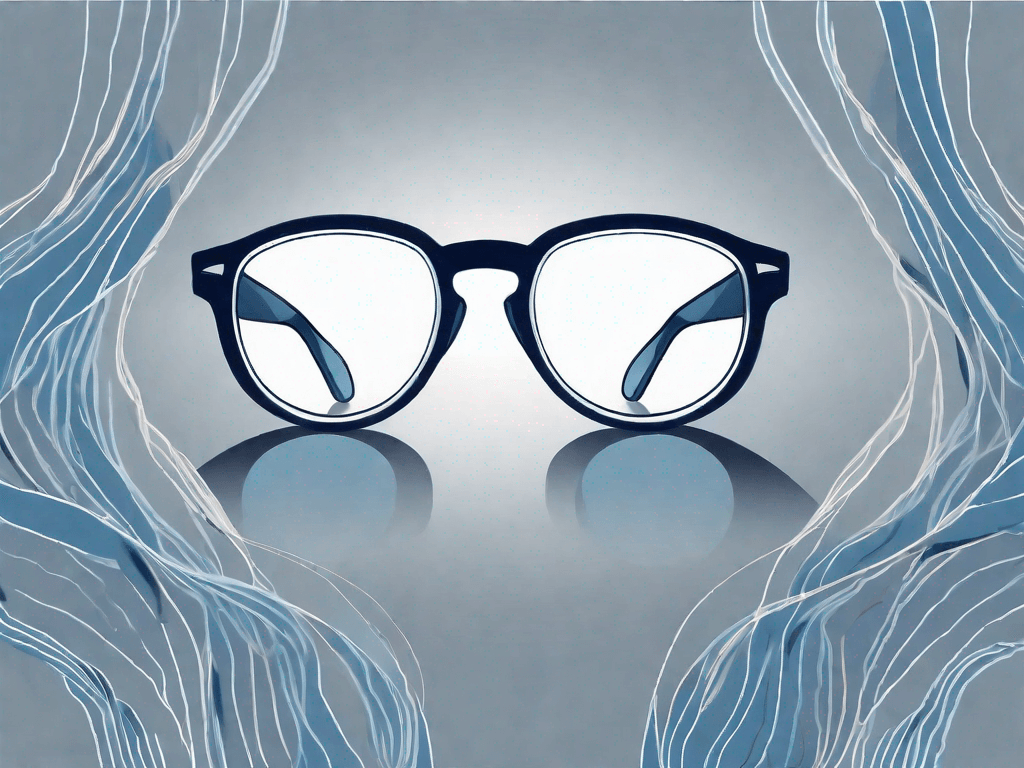Do Blue Light Glasses Help With Astigmatism?
Astigmatism is a common eye condition that affects many individuals worldwide. If you suffer from astigmatism, you may be wondering if blue light glasses can help alleviate your symptoms. In this article, we will answer the question do blue light glasses help with astigmatism and explore the relationship between blue light glasses and astigmatism, as well as other treatment options you may consider.
Understanding Astigmatism
If you are unfamiliar with astigmatism, it is essential to grasp the basics before delving into the potential benefits of blue light glasses. Astigmatism refers to an irregular curvature of the cornea or lens, leading to blurred vision.
Astigmatism occurs when the cornea or lens is shaped more like a football than a round soccer ball. As a result, light entering the eye focuses on multiple points rather than a single, sharp image on the retina. This can cause visual distortion and difficulties in focusing on both near and far objects.
Imagine looking at a beautiful landscape, but instead of seeing a clear and crisp view, the image appears fuzzy and distorted. This is what individuals with astigmatism may experience on a daily basis. The irregular shape of the cornea or lens prevents light from properly focusing on the retina, resulting in blurred vision.
Common symptoms of astigmatism include blurry vision, eye strain, headaches, and squinting. These symptoms can significantly impact one's quality of life, making it difficult to perform everyday tasks such as reading, driving, or even recognizing faces.
Imagine trying to read a book, but the words appear smudged and difficult to decipher. This can cause eye strain and fatigue, leading to headaches and discomfort. Squinting may become a habit for individuals with astigmatism as they try to bring objects into focus.
If you are encountering these issues, it is crucial to consult an eye care professional for a comprehensive eye exam. They will be able to diagnose astigmatism and recommend appropriate treatment options.
Fortunately, there are various ways to manage astigmatism and improve visual acuity. Eyeglasses and contact lenses with special lens designs can help correct the irregular curvature of the cornea or lens, allowing light to properly focus on the retina. In some cases, refractive surgery may be an option to permanently reshape the cornea and correct astigmatism.
It is important to remember that astigmatism is a common vision condition that can affect individuals of all ages. Regular eye exams are essential for early detection and proper management of astigmatism. By understanding astigmatism and its symptoms, you can take proactive steps to maintain good eye health and ensure clear vision.
The Science Behind Blue Light Glasses
Before determining if blue light glasses can help with astigmatism, it is essential to understand how they work and the potential benefits they offer.
Blue light glasses are specifically designed to filter out or block the harmful blue light emitted from digital devices, such as smartphones, tablets, and computers. These glasses feature lenses with a coating that reduces the transmission of blue light, alleviating eye strain and fatigue.
But what exactly is blue light? Blue light is a high-energy visible (HEV) light with a short wavelength, ranging from approximately 380 to 500 nanometers. It is emitted by the sun, as well as digital screens and electronic devices. While blue light is naturally present in daylight and can be beneficial for regulating our sleep-wake cycle, excessive exposure to artificial blue light can have negative effects on our eyes and overall well-being.
When we stare at screens for prolonged periods, our eyes are exposed to a significant amount of blue light. This exposure can cause digital eye strain, also known as computer vision syndrome, which is characterized by symptoms like dry eyes, blurred vision, headaches, and neck and shoulder pain. Blue light glasses help to mitigate these symptoms by reducing the amount of blue light that reaches our eyes.
Potential Benefits of Blue Light Glasses
While blue light glasses have gained popularity for their potential to reduce eye strain and improve sleep quality, their impact on astigmatism remains a topic of discussion and research.
Astigmatism is a common vision condition that occurs when the cornea or lens of the eye has an irregular shape. This irregularity causes blurred or distorted vision at all distances. Blue light glasses, however, do not correct the underlying irregular curvature of the cornea or lens associated with astigmatism.
That being said, some individuals with astigmatism have reported subjective improvements in their visual comfort when using blue light glasses. These glasses may help reduce eye strain and fatigue, which can indirectly improve the overall visual experience for individuals with astigmatism.
It is important to note that while blue light glasses can provide relief from symptoms associated with digital eye strain, they are not a substitute for regular eye examinations and proper vision correction. If you have astigmatism or any other vision condition, it is crucial to consult with an eye care professional for a comprehensive evaluation and appropriate treatment options.
In conclusion, blue light glasses are designed to filter out or block harmful blue light, providing potential benefits such as reduced eye strain and improved sleep quality. While they may offer subjective improvements in visual comfort for individuals with astigmatism, they do not correct the underlying irregular curvature of the cornea or lens. It is always best to seek professional advice for any vision-related concerns.
Blue Light Glasses and Astigmatism
While blue light glasses may help alleviate eye strain caused by prolonged digital device use, their direct effect on astigmatism is limited.
The Effect of Blue Light on Astigmatism
Exposure to blue light does not worsen or improve astigmatism itself. Astigmatism is a structural issue with the eye, and blue light does not directly address the irregular curvature of the cornea or lens.
However, it is important to note that blue light can still have an impact on overall eye health. Studies have shown that excessive exposure to blue light emitted from digital screens can disrupt the sleep-wake cycle, leading to sleep disturbances and fatigue. Additionally, blue light has been linked to an increased risk of age-related macular degeneration, a leading cause of vision loss in older adults.
Therefore, while blue light glasses may not directly correct astigmatism, they can still be beneficial in reducing the potential negative effects of blue light on the eyes.
Can Blue Light Glasses Correct Astigmatism?
Blue light glasses cannot correct astigmatism. They are not a substitute for prescription glasses specially tailored to correct astigmatism-related visual disturbances. Thus, if you have astigmatism, it is important to consult an eye care professional for an accurate diagnosis and appropriate treatment.
When it comes to astigmatism, the irregular curvature of the cornea or lens causes light to focus on multiple points instead of a single point on the retina. This results in blurred or distorted vision. Prescription glasses for astigmatism are designed to compensate for these irregularities, allowing light to properly focus on the retina and providing clear vision.
It is crucial to have regular eye examinations to monitor the progression of astigmatism and ensure that the prescription is up to date. Your eye care professional will take into account the specific characteristics of your astigmatism and prescribe glasses that are tailored to your individual needs.
While blue light glasses may not correct astigmatism, they can still be used in conjunction with prescription glasses to provide additional protection against blue light. Many eyewear manufacturers offer prescription glasses with blue light filtering capabilities, combining the benefits of astigmatism correction and blue light reduction.
Remember, protecting your eyes from excessive blue light exposure is important for maintaining good eye health, regardless of whether you have astigmatism or not. Incorporating regular breaks from digital screens, adjusting screen brightness and contrast settings, and practicing the 20-20-20 rule (looking at something 20 feet away for 20 seconds every 20 minutes) can also help reduce eye strain and promote overall eye comfort.
Other Treatment Options for Astigmatism
If you have astigmatism and are seeking treatment options beyond blue light glasses, there are several alternatives available. In addition to blue light glasses, there are other treatment options that can help improve your vision and alleviate the symptoms of astigmatism.
Prescription Glasses and Contact Lenses
Prescription glasses and contact lenses are the most common treatment options for astigmatism. These corrective lenses are precisely customized to compensate for the irregular curvature of the cornea or lens, providing clear and sharp vision. Prescription glasses come in various styles and designs, allowing you to find a pair that suits your personal style and preferences. Contact lenses, on the other hand, offer the advantage of being virtually invisible and providing a wider field of vision compared to glasses.
When it comes to prescription glasses, there are different lens options available, such as high-index lenses for those with higher prescriptions, anti-reflective coatings to reduce glare, and photochromic lenses that darken in sunlight. Additionally, there are specialized lenses designed for specific activities like sports or computer use, which can further enhance your visual experience.
Contact lenses also offer various options, including daily disposable lenses for convenience, extended wear lenses for continuous use, and toric lenses specifically designed to correct astigmatism. It is important to consult with an optometrist or ophthalmologist to determine the most suitable type of lenses for your specific needs and lifestyle.
Laser Eye Surgery
Another option is laser eye surgery, such as LASIK (Laser-Assisted In Situ Keratomileusis) or PRK (Photorefractive Keratectomy). These procedures reshape the cornea using a laser to correct astigmatism and other refractive errors. LASIK is a popular choice for many individuals due to its quick recovery time and high success rate. However, not everyone is a suitable candidate for laser eye surgery, and it is necessary to consult with an eye care professional to determine if you meet the necessary criteria.
During the consultation, the eye care professional will evaluate your eye health, corneal thickness, and overall suitability for the procedure. They will also discuss the potential risks and benefits associated with laser eye surgery, ensuring that you have all the information needed to make an informed decision.
If you are deemed a suitable candidate, the surgery itself is usually quick and painless. The laser is used to precisely reshape the cornea, correcting the astigmatism and improving your vision. After the procedure, you will be provided with detailed post-operative instructions to ensure proper healing and optimal results.
It is important to note that while laser eye surgery can be highly effective in treating astigmatism, there are potential risks and complications associated with the procedure. These can include dry eyes, glare, halos, and temporary or permanent changes in vision. Therefore, it is crucial to have a thorough discussion with your eye care professional to weigh the potential benefits against the risks and determine if laser eye surgery is the right choice for you.
Overall, there are several treatment options available for astigmatism beyond blue light glasses. Whether you opt for prescription glasses, contact lenses, or laser eye surgery, consulting with an eye care professional is essential to determine the most suitable treatment option for your specific needs and to ensure the best possible outcome for your vision.
Making the Right Choice for Your Eyes
Choosing the appropriate eyewear for astigmatism requires careful consideration of various factors. Astigmatism is a common vision condition that occurs when the cornea or lens of the eye is irregularly shaped, causing blurred or distorted vision. Fortunately, there are several options available to correct astigmatism and improve your vision.
When deciding between blue light glasses, prescription glasses, or contact lenses, it is important to consider factors such as the severity of your astigmatism, your lifestyle, and your visual requirements. Blue light glasses are designed to filter out the harmful blue light emitted by digital devices, which can cause eye strain and discomfort. However, they do not correct the underlying astigmatism. Prescription glasses, on the other hand, are custom-made to address your specific astigmatism and provide clear vision. Contact lenses are another popular option for astigmatism correction, offering convenience and a wider field of view compared to glasses.
An eye care professional can guide you in selecting the best option tailored to your specific needs. They will take into account the severity of your astigmatism, your daily activities, and any other vision problems you may have. During a comprehensive eye examination, the eye care professional will measure the curvature of your cornea and assess the overall health of your eyes. Based on the results, they will recommend the most suitable treatment to improve your vision and overall eye health.
Consulting with an eye care professional is crucial when it comes to finding the most suitable treatment for astigmatism. They have the expertise and knowledge to accurately diagnose your condition and recommend the most appropriate course of action. Whether it's prescription glasses, contact lenses, or even laser eye surgery, they will consider your unique case and provide personalized recommendations.
In conclusion, while blue light glasses may help alleviate eye strain and discomfort associated with prolonged digital device use, they do not correct astigmatism. For individuals with astigmatism, prescription glasses, contact lenses, or laser eye surgery may be more effective treatment options. It is important to consult with an eye care professional to determine the best course of action for your unique case of astigmatism. Remember, taking care of your eyes and making informed choices will ensure optimal vision and eye health.





